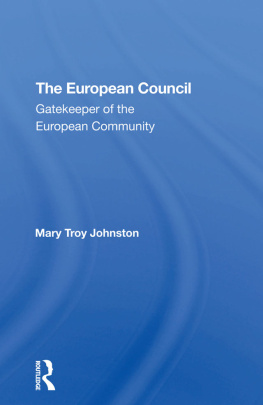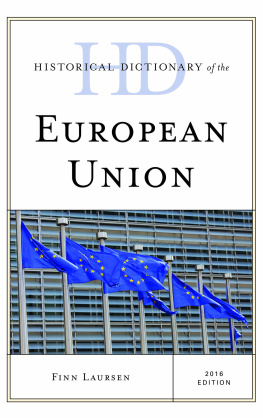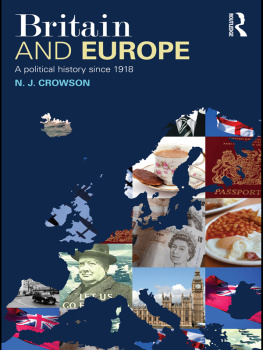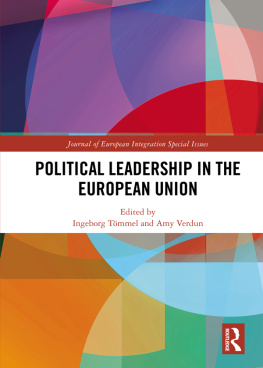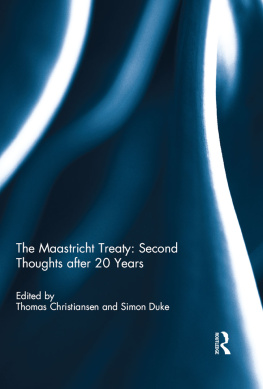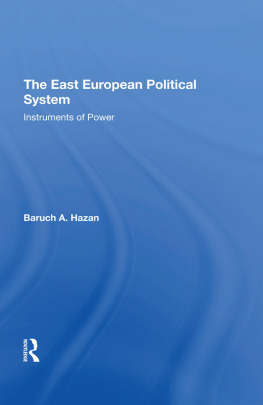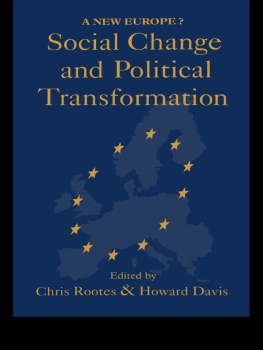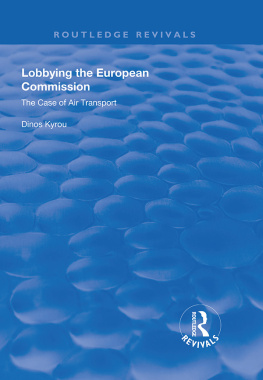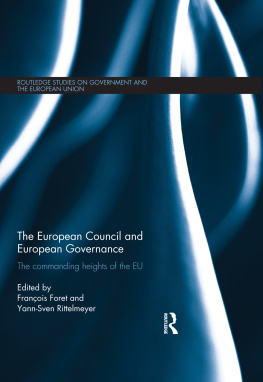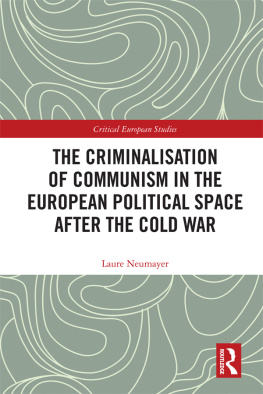First published 1994 by Westview Press, Inc.
Published 2019 by Routledge
52 Vanderbilt Avenue, New York, NY 10017
2 Park Square, Milton Park, Abingdon, Oxon OX14 4RN
Routledge is an imprint of the Taylor & Francis Group, an informa business
Copyright 1994 Taylor & Francis
All rights reserved. No part of this book may be reprinted or reproduced or utilised in any form or by any electronic, mechanical, or other means, now known or hereafter invented, including photocopying and recording, or in any information storage or retrieval system, without permission in writing from the publishers.
Notice:
Product or corporate names may be trademarks or registered trademarks, and are used only for identification and explanation without intent to infringe.
Library of Congress Cataloging-in-Publication Data
Johnston, Mary Troy.
The European Council : Gatekeeper of the European Community / by Mary Troy Johnston.
p. cm.
Includes index.
ISBN 0-8133-8505-9
1.European Economic Community. European Council. 2.European federation. I. Title.
JN15.J64 1994
321'.04'094dc20
93-29167
CIP
ISBN 13: 978-0-367-29185-3 (hbk)
U.S. scholars responded to the first decade of the European Economic Community, as it was then called, with fascination that yielded volumes of advanced theories on the processes of supranational integration. During the 1970s, the Community's decisionmaking crisis disappointed observers and seemed to require little scholarly attention in the United States. At the time I began researching the European Council in 1987, the academic community here reawakened to a European Community (EC) transformed especially in the complexity of its institutional dynamics. The expectations of previous decades regarding EC institutional patterns of behavior were no longer sufficient. The need for new and revised theories was widely stated. I was convinced that the need was as great for careful empirical evaluation to inform theory building, the main consideration that influenced my research.
This work represents my contribution to developing a new understanding of the EC, an understanding already well-advanced by the excellent recent works of U.S. scholars. Among European scholars, some devoted several decades to this subject and others drew from their own experience in service to the EC to add to our knowledge. On my particular subject, I was fortunate to be able to rely on the solid documentation of Simon Bulmer's and Wolfgang Wessels' The European Council: Decision-Making in European Politics (1987). I am grateful to the authors for establishing beyond a doubt the significance of this institution. Jan Werts' published legal dissertation, The European Council (1992), is outstanding for its scope and research. Regrettably, it only came to my attention after my manuscript was complete.
The analysis I offer here reflects a markedly positive view of the European Council and was influenced by the time frame during which I conducted my research. I arrived in Brussels for the first interviews in 1987. The EC institutions were involved in the preliminary negotiations necessary to prepare the Copenhagen European Council of December 1987. The "Delors Plan," the subject of sole agenda item at Copenhagen. Especially interesting for my purposes was the technical complexity of the Delors Plan. In the past it was generally understood that heads of government should not be asked to deal with technicalities because they lacked the expertise as well as the time to adequately comprehend and decide such issues. Its success with the Delors Plan suggested that the European Council had greater decisionmaking capacity than previously understood. Additional interviews I conducted in London in 1991, as officials prepared the Maastricht European Council, reinforced this conclusion.
I am grateful for the extremely kind receptions I received in Brussels and in London. Frequently my requests for interviews in Brussels were met with the response that I would be meeting a member country's official in charge of European Council preparations. A question I intended to explore in Brussels was the role of the "Antici," an official who serves as a liaison between national politicians and national delegations of officials during European Council meetings. In Brussels I discovered that the interviewees "in charge of European Council preparations" were Anticis, and I enjoyed the special pleasure of meeting the majority of the Antici group. Consistently, interviewees from the member governments, the Commission, the Council secretariat and the European Parliament generously provided information and assistance.
Financing for the trip to Brussels and income for a year of dissertation research and writing was provided by the Selley Foundation at Tulane University, New Orleans, La., established by Paul and Elizabeth Selley in 1987. I am deeply indebted to the Selleys for their insight into what is required in terms of original research and concentrated effort to produce a quality study. The generosity of Loyola University, New Orleans, La., supplied a travel grant that made possible the research in London in 1991.
During the dissertation stage of this project, it was my great fortune at Tulane to have Dr. William B. Gwyn as my major professor, advisor, and dear friend. I.benefited immensely from his mastery of research skills and expertise in cross-national comparisons in Western Europe and institutional behavior. He supported me in all of my pursuits, including my pursuing an academic career while also building a family. At Tulane, Dr. James D. Cochrane and Dr. Henry L. Mason shared their considerable expertise in "regional integration" with me. In addition to those mentioned above, I am grateful to Dr. James F. Davidson for encouraging my scholarly development. As for friendships cemented during this period, Dr. Elba De Lugo and I braved graduate school together.
In 1988 I accepted a teaching position at Loyola University in the department of political science. The members of this department could not have been more supportive and helpful. For advice about computers and elite interviewing, I am grateful to Dr. Conrad Raabe. For their attention to the manuscript, I owe special appreciation to our department chairperson, Dr. Phil Dynia, and members Dr. Stan Makielski and Dr. Eric Gorham. Phil demonstrated over and over again his commitment to my success. Stan gave almost daily assistance that included editing the entire manuscript, his sweeping intellect and personal goodness always in evidence. Only if I continued his tradition of dedicated service to students and colleagues would Stan find satisfaction in repayment of his contribution. My student Michael Starke enthusiastically assisted me with research. Loyola colleagues Dr. William Barnett, Dr. Chris Lingle, and Dr. Bernard Cook graciously read all or parts of the manuscript and added their particular expertise, as did the Italian Consul in New Orleans, Dr. Fabrizio Mazza.
For document production I wholeheartedly appreciate the efforts of Jenny Rubick. If not for Jenny, my work would have been extended many months and made much harder for the lack of comic relief. At Westview Press, Alison Auch was most considerate and competent as the assistant acquisitions editor. The law firm of Sullivan, Stolier and Daigle of New Orleans, was exceedingly kind to provide computer services. Aware of the valuable contributions of so many, I alone am responsible for the final product and all of the conclusions and information within.

